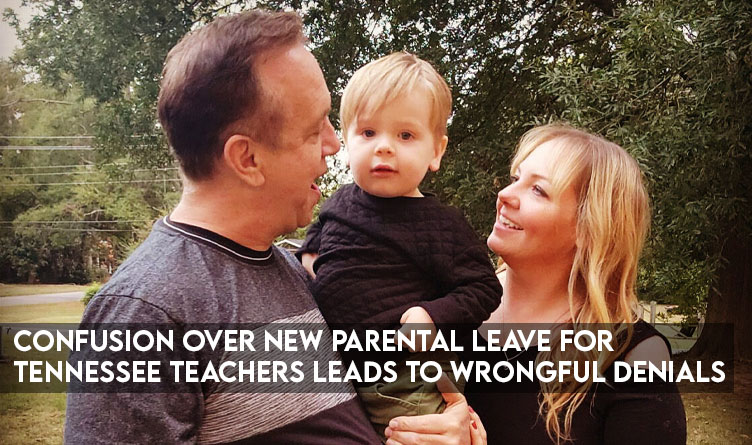The Tennessee Legislature Approved Paid Leave For Public School Teachers, But Many Aren’t Aware Of The Policy, While School Districts Grapple With Details.
Image: Tipton County teacher Kathryn Vaughn, pictured with her husband and son, said she’s received a new policy allows paid family leave after childbirth. Image Credit: submitted photo
By Anita Wadhwani [Tennessee Lookout -CC BY-NC-ND 4.0] –
Six months after Tennessee lawmakers approved paid parental leave for public school teachers and staff, confusion and misinformation has led to some teachers being wrongly denied leave and others unaware they are entitled to it, educators and advocates say.
The unanimous and bipartisan approval last May of six-week paid parental leave for educators caught even supporters by surprise. Just three years earlier, Gov. Bill Lee walked away from his own state employee family leave proposal after pushback from GOP lawmakers.
But after a pandemic that highlighted a frayed safety net for working parents and relentless advocacy by teachers and organizations promoting parental leave, the Legislature easily passed the measure, along with a new law giving paid parental leave to state employees. Lawmakers put money behind it too.

With a $15 million annual appropriation, the law guarantees six paid weeks off to any public school educator who requires a license — a broad definition that includes teachers, bus drivers and nurses — after a birth, stillbirth or adoption. The law applies to non-birthing parents as well. Tennessee was only the second state in the South to extend paid parental leave to its public school employees, after Georgia.
The problem, advocates say, now lies in making the fully-funded policy uniformly accessible across the state’s 141 school districts.
Feroza Freeland, a policy associate with A Better Balance, says the working parent advocacy group’s helpline has received calls from teachers and staff in at least ten different school districts concerned about their legal right to take parental leave.
“Based on the calls we have received from educators and support staff across the state, it appears that there has been some confusion at the district level about this new policy, especially around questions of who is covered,” said Freeland.
“We have spoken with some educators who were initially told that they would not be eligible for paid parental leave, but according to new guidance from the state Department of Education, they actually are eligible.” she said.
The department issued the new guidance last week, months after A Better Balance first approached the agency to relay concerns they heard from callers to the helpline.
In Tipton County in west Tennessee, elementary art school teacher Kathryn Vaughn described widespread confusion about the new policy.
First, administrators updated the teacher handbook with a vaguely worded explanation that led to more questions.

After Vaughn approached the district, it sent out a district-wide email clarifying the law.
“When the law went into effect, I expected districts to issue press releases, do media stories,” she said. “I don’t think people know about this. It’s amazing they haven’t communicated this more effectively to teachers and prospective teachers. It should be used as the recruiting tool that it is.”
Vaughn has long advocated for paid parental leave after her own difficult experiences saving up sick leave for the birth of her first son two years ago. When she experienced a miscarriage during a subsequent pregnancy, she stayed on the job, in pain, because she hoped to preserve sick time for a hoped-for next pregnancy.
As she and her husband try for another pregnancy, she said it is a relief to not have to squirrel away sick leave or pick up a second job — as she did while pregnant with her son — to prepare for another baby.
Tanya Coats, president of the Tennessee Education Association, said she was giving some grace to state officials and local districts in the uneven rollout of the policy. The law went into effect in May, after schools closed for summer break, and it’s been three months since the new school year began.
“I bet you some districts really don’t understand the complexity of (the law) and how it works,” she said. “I think we need to do a better job in communicating. For us at TEA since it’s new we’re going to take in on grace this year.”




